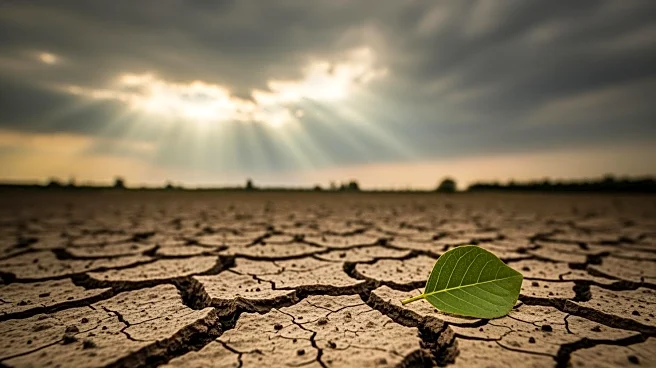What's Happening?
The 30th Conference of the Parties (COP 30) held in Belem, Brazil, concluded with little advancement in addressing the global climate crisis. Despite high expectations, the conference ended with a compromise resolution that failed to reflect an ideal
solution. The participating countries, each with different economic backgrounds and priorities, struggled to agree on strategies to combat climate change. The conference highlighted the ongoing rise in global temperatures, projected to exceed 1.5 degrees Celsius for the first time during the 2023-2025 period. This increase is attributed to the unchecked emissions of greenhouse gases such as carbon dioxide and methane, primarily from fossil fuel use. Despite previous commitments by countries like the USA and China to eliminate emissions by specific timelines, the steps taken remain insufficient. The continued production and use of coal and crude oil by major producers like China, India, and the USA further exacerbate the issue.
Why It's Important?
The lack of significant progress at COP 30 underscores the challenges in achieving global consensus on climate action. The continued rise in global temperatures poses severe risks, including extreme weather events, sea-level rise, and disruptions to ecosystems. The failure to agree on emission reduction timelines and financial assistance for developing countries highlights the divide between developed and developing nations. This impasse threatens the effectiveness of international efforts to mitigate climate change and could lead to increased environmental and economic instability. The reliance on fossil fuels remains a critical barrier to reducing emissions, and the slow transition to renewable energy sources further complicates efforts to address the climate crisis.
What's Next?
The conclusion of COP 30 without a clear agreement suggests that countries may continue to pursue individual strategies to manage their economies and development plans, potentially at the expense of global climate goals. The ongoing production and consumption of fossil fuels are likely to persist, contributing to further emissions. The development of alternative energy sources, such as hydrogen, remains uncertain due to technological and cost challenges. Future COP meetings will need to address these issues more effectively to prevent further environmental degradation and to foster international cooperation in combating climate change.
Beyond the Headlines
The discussions at COP 30 also overlooked the emissions caused by conflicts and wars, which contribute significantly to global warming. The use of drones and missiles in warfare results in fire hazards and the release of noxious gases, yet this aspect was not addressed during the conference. The lack of focus on this issue highlights the complexity of the climate crisis and the need for comprehensive strategies that consider all sources of emissions. The disagreement over financial assistance for developing countries further complicates efforts to achieve equitable climate solutions.















